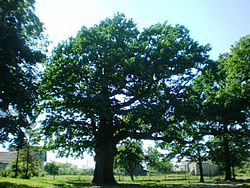- Mikalojus Daukša
-
Mikalojus Daukša in Varniai

Mikalojus Daukša (other possible spellings include Mikalojus Daugsza, Polish: Mikołaj Dauksza and Mikolay Dowksza;[1] after 1527 – February 16, 1613 in Medininkai) was a Lithuanian and Latin[2] religious writer, translator and a Catholic church official. He is best known as the first among Lithuania's humanists to underline the need to codify and promote the Lithuanian language over Chancery Ruthenian and Polish, which were in use in the Grand Duchy at the time.[3] Daukša's Lithuanian translation of Jacob Ledesma's catechism became the first book in Lithuanian to be published in the Grand Duchy of Lithuania.
Born probably after 1527 somewhere in the territory of the Grand Duchy of Lithuania (in Babėnai?),[4][5][6] Daukša probably received his education in Vilnius and at one of the Western European Universities.[6] He spoke several languages and had a personal library including books by Erasmus of Rotterdam and Philip Melanchthon.
Daukša was a canon of Medininkai (nowadays Varniai) and an official member of the Samogitia.[7] Under the auspices of bishop Melchior Giedroyć, he translated the catechism by the Spanish Jesuit theologist Jacobo Ledesma.[8] The book, translated from the Polish translation by Jakub Wujek, was published in 1595, and became one of the means to fight paganism. Paganism was at that time still practiced in Lithuania. The work also served to counter the growing threat posed to Catholicism by the Reformation, which was promoted in Lithuania by the mighty Radziwiłł family. It was also the first book in Lithuanian to be printed in the Grand Duchy of Lithuania.
In 1599 Daukša published another important work, the Lithuanian translation of the Polish language collection of sermons by Jakub Wujek, the "Postilla catholica".[9] There are two prefaces to this work, one in Latin and one in Polish.[10] In the Polish preface, Daukša advocates the promotion of the Lithuanian language in the Grand Duchy and gave a brief definition of the Lithuanian nation and state.[2][10] The book is regarded as more valuable and important than the Catechism, and constitutes one of the monuments of the Lithuanian language.[6]
In his translations, Daukša used the central High Lithuanian dialect, influenced by both eastern High Lithuanian and Samogitian.[5] As one of pioneers of written Lithuanian, he is credited with the introduction of several neologisms, among them mokytojas (teacher), valia (will), įkvėpimas (inspiration) and išmintis (wisdom).[6] Of special importance for our knowledge of the Lithuanian language are the accent signs Daukša employs in the Postilla.
References
- ^ (Lithuanian) Konstantinas Jablonskis (1973). Lietuvių kultūra ir jos veikėjai. Vilnius: Mintis; Lietuvos TSR mokslų akademija. pp. 129. "Mikolay Dowksza"
- ^ a b (Polish) Eugenija Ulčinajtė (2 2004). "Latinitas jako część litewskiej historii kultury i literatury". Terminus (Kraków: Ośrodek Badań nad Renesansem, Jagiellonian University) (2). http://humanitas.filg.uj.edu.pl/files/terminus/artykuly/9bcdab3baa29b3ac9726f8d6eab347d4.pdf. Retrieved 2007-11-07.
- ^ (Polish) Anna Jamróz, Magdalena Olkuśnik, Elżbieta Wójcik, ed (2001). "DAUKSZA Mikołaj". Popularna encyklopedia powszechna. 3. Kraków: Fogra. ISBN 8385719598.
- ^ (English) various authors (1969). Gordon B. Ford. ed. Old Lithuanian Texts of the Sixteenth and Seventeenth Centuries with a Glossary. The Hague: Mouton.
- ^ a b As cited in: (English) "Mikalojus Dauksa". Postilla 400. Samogitian Cultural Association. http://postilla.mch.mii.lt/Dauksa/apiedauksa.en.htm. Retrieved 2007-11-07.
- ^ a b c d Venclova, Tomas (2006). Vilniaus vardai. Vilnius: R. Paknio leidykla. pp. 36–37. ISBN 9986-830-96-6.
- ^ Polish Biographical Dictionary
- ^ Full title in (Lithuanian) Kathechismas arba mokslas kiekwienam priwalvs. Paraszytas per D. Iakvba Ledesma Theologa Societatis IESV
- ^ Full title in (Lithuanian): Postilla catholicka. Tai est izguldimas ewangeliu...
- ^ a b "The Preface Unto Benevolent Reader". Lithuanian Classic Literature Antholgy. http://antologija.lt/texts/4/main.html. Retrieved 2008-05-16.
External links
- (English) Daukša's place in the history of Lithuanian language and literature at Lithuanian Classic Literature anthology by the Institute of Lithuanian Scientific Society
- (Lithuanian) Short bio
- (Polish) Tomas Venclova on Daukša
Categories:- 1520s births
- 1613 deaths
- People from Kaunas County
- 16th-century Latin-language writers
- Lithuanian Christians
- Lithuanian translators
- Lithuanian writers
- Polish translators
- Translators to Lithuanian
Wikimedia Foundation. 2010.


